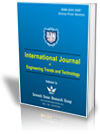Optimization of Injection Pressure and Injection Timing of a Diesel Engine Fuelled with Optimized Blend of B25 Cotton Seed Oil Biodiesel
Citation
MLA Style: K.Vijayaraj, A.Muruga Ganesan "Optimization of Injection Pressure and Injection Timing of a Diesel Engine Fuelled with Optimized Blend of B25 Cotton Seed Oil Biodiesel" International Journal of Engineering Trends and Technology 66.2 (2018): 96-102.
APA Style:K.Vijayaraj, A.Muruga Ganesan (2018). Optimization of Injection Pressure and Injection Timing of a Diesel Engine Fuelled with Optimized Blend of B25 Cotton Seed Oil Biodiesel. International Journal of Engineering Trends and Technology, 66(2), 96-102.
Abstract
Globally the demand for diesel and petrol is alarming due to speedy depletion of fossil fuel and hyper increase of automobiles in the current years. It results in seeking an alternate for fuel that led to many findings of alternative fuels. The previous researchers have exposed the utility of vegetable oils for engines as an alternative for diesel fuel. However, there is a constraint in using vegetable oils in diesel engines due to their high viscosity and low volatility. In this study, raw cotton seed oil is converted into biodiesel (Methyl Ester of Cotton Seed Oil) through transesterification process and finds the impact of injection pressures (190, 200, 210, 220 and 230 bar) and injection timings (21o, 23o and 25o bTDC) on combustion, performance and emission parameters of optimized blend (B25) of cotton seed oil biodiesel with diesel in a single cylinder diesel engine. From the investigation, it is found that in a diesel engine the optimum injection pressure is 200 bar and injection timing is 23o bTDC for the optimized blend of B25 cotton seed oil biodiesel and could be used as an alternative fuel with no modification of the diesel engine.
Reference
[1] Sylvester C.Izah and Elijah I.Ohimain, 2013, The challenge of biodiesel production from oil palm feedstock in Nigeria. Greener journal of Biological sciences, 3 (1); 001-012.
[2] Sandeep Singh, 2012. Study of various methods of biodiesel production and properties of biodiesel prepared from waste cotton seed oil and waste mustard oil. Thesis of M.E.in thermal engineering, Thapar University.
[3] Shereena, K.M. and T.Thangaraj, 2009. Biodiesel: An alternative fuel produced from vegetalbe oils by transesterification. Electronic journal of Biology, 3; 67-74.
[4] Dennis.Y.C. Leung, Xuan.Wu and M.K.H.Leung, A review on biodiesel production using catalysed transesterification, Applied Energy 87 (2010) 1083-1095.
[5] P.K.Devan and N.V. Mahalakshmi, A study of the performance, emission and combustion characteristics of a compression ignition engine using methyl ester of paradise oil-eucalyptus oil blends, Applied Energy 86 (2009) 675-680.
[6] Avinash K Hegde and K.V. Sreenivas rao, Performance and emission study of 4S CI engine using Calophyllum Inophyllum biodiesel with additives, International Journal on Theoretical and Applied Research Mechanical Engineering 1 (2012) 1-4.
[7] Subhash Lahane and K.A. Subramanian, Impact of nozzle holes configuration on fuel spray, wall impingement and NOx emission of a diesel engine for biodiesel- diesel blend (B20), Applied Thermal Engg., 64 (2014) 307-314.
[8] Rakopoulos, C.G. Rakopouls, E.G.Giakoumis, A.M.Dimaratos and M.A.Founti, Comparative environmental behavior of bus engine operating on blends of diesel fuel with four straight vegetable oils of Greek origin: sunflower,cottonseed, corn and olive, Journal of Fuel 90 (2011) 3439-3446.
[9] N.Saravanan, G. Nagarajan and S. Puhan, Experimental investigation on a DI diesel engine fuelled with Madhuca Indica ester and diesel blend, Biomass and Bioenergy 34 (2010) 838-843.
[10] L.N.R.Gattamaneni, S. Sravanan, S.Sampath and K.Rajagopal, Combustion and emission characteristics of diesel engine fuelled with rice bran oil methyl ester and its diesel blends, Thermal sci., 12 (2008) 139-150.
[11] K.Rajan and K.R.S. Kumar, Performance and emission characteristics of DI ignition engine with biodiesel using internal jet piston, Environ. Stud., 64 (2010) 1982-1988.
[12] Sharanappa Godiganur, Suryanarayana Murthy and CH.Ranaprathap reddy, 6BTA 5.9 G2-1 Cummins engine performance and emission tests using methyl ester Mahua (Madhuca indica) oil/diesel blends, Renewable Energy 34 (2009) 2172-2177.
[13] T.Balusamy and R. Marappan, Comparative study of Thevetia Peruviana seed oil with other biofuels and diesel as fuel for CI engine, International Journal of Applied Engineering Research, 10 (2008) 93-100.
[14] D.H. Qi, L.M. Geng, H. Chen, Y.Z.H. Bian and J. Liu, Combustion and performance evaluation of a diesel engine fueled with biodiesel produced from soybean crude oil, Renewable Energy, 34 (2009) 2706-2713.
[15] S.Jain and M.P.Sharma, Biodiesel Production from Jatropha Curcas Oil, Renewable and Sust.Energy Reviews,14 (2011) 3140-47.
[16] Qi, D.H., L.M. Geng, H. Chen, Y.Z.H. Bian and J. Liu et al., 2009. Combustion and performance evaluation of a diesel engine fueled with biodiesel produced from soybean crude oil. Renew Energy, 34: 2706-2713.
[17] Honnegowda and Ramesha D.K. (2013), Effect of injection pressures on the performance and emission characteristics of CI engine with cotton seed oil methyl ester, International Journal of Innovative Research in Science Engineering and Technology, 2 No: 9; 4796-4802.
[18] Solaimuthu, C., P.Vetrivel, MR. Subbarayan and Channankaiah, 2014. Efffect of nozzle opening pressures on diesel engine fuelled with madhuca indica biodiesel and its blend with diesel fuel, Indian Journal of Engineering,7(17);14-22.
[19] Chandrakasan Solaimuthu and Palanisamy Govindarajan, 2012. Effect of injection timing on performance, combustion and emission characteristics of diesel engine using mahua oil methyl ester as fuel, Journal of Scientific and Industrial Research, 71; 69-74.
[20] Jindal.S, 2011. Effect of injection timing on combustion and performance of a direct injection diesel engine running on Jatropha methyl ester. International Journal of Engineering and Environment, 2(1); 113-122.
[21] Dillip Sutraway, Y.U.Biradar and V.V.Katti, 2014. Effect of fuel injection time on performance of CI engine using (Simarouba)biodiesel as fuel. Journal of Mechanical Engineering Research and Technology,2 (1);556-572.
[22] Jindal.S, 2010. Effect of engine parameters on NOx emissions with Jatropha biodiesel as fuel.International Journal of Engineering and Environment, 1(2); 343-350.
[23] Elango,T. and T.Senthilkumar, 2011.Performance and emission characteristics of CI engine fuelled with non-edible vegetable oil and diesel blends, Journal of Engineering Science and Technology, 6; 240-250.
Keywords
Cotton seed oil biodiesel, injection pressure, injection timing, combustion, performance, emission.



